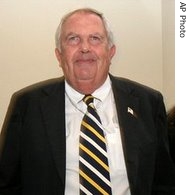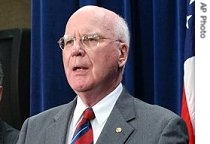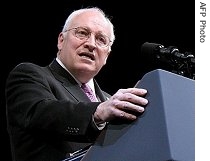2007年VOA标准英语-White House, Congressional Democrats Heading fo(在线收听)
Capitol Hill
28 June 2007
President Bush and majority Democrats in Congress are heading toward a constitutional showdown involving the controversy over the firing of federal prosecutors. VOA's Dan Robinson reports, Democrats accuse the president and vice president of being above the law regarding that and other issues.
 |
| Fred Fielding (March 2007 photo) |
Those documents involve former presidential counsel Harriet Miers and former political director Sara Taylor, both of whom were also supposed to appear at public hearings under congressional subpoenas.
Fielding said the executive privilege claim pertained only to documents, but he and other officials made clear the president would also apply it specifically to testimony by both former officials.
The White House maintains that its release of 8,500 pages of documents, testimony by Attorney General Alberto Gonzalez at congressional hearings, and an offer to have Miers, Taylor, and Karl Rove, the president's close political adviser, be interviewed behind closed doors without transcripts should be sufficient.
 |
| Sen. Patrick Leahy discusses the Senate Judiciary Committee's issuance of subpoenas for legal basis of domestic surveillance program on Capitol Hill, 27 June 2007 |
Senator Chuck Schumer also addressed the issue.
"The U.S. attorneys investigation asks so many questions, so many questions about the rule of law and the truth will come out," he said. "Senator Leahy, I talked to him this morning, and we will pursue whatever it takes to get this information to come out, but it is regrettable that the White House is trying to hide the facts. When an administration is trying to hide the facts, when an administration is unwilling to put forward its facts, you wonder what they have to hide."
Democrats also continue to seek documents and testimony on other issues, including the administration's warrantless program of electronic eavesdropping. The Senate Judiciary Committee issued a subpoena to Vice President Dick Cheney's office demanding documents on that matter.
However, the ranking Republican on the committee, Arlen Spector, questioned whether a subpoena to the vice president's office is beyond the scope of the committee's authorization.
"I think there needs to be a refinement of these subpoenas to come within the scope of what has been authorized and then to see even within that scope, which is much narrower then the subpoenas issued, to see if we can resolve this matter," he said.
The standoffs over congressional demands, subpoenas, and executive privilege could lead to congressional contempt citations, and a battle in federal court which might not be resolved for many months, if at all before President Bush leaves office.
Senator Spector suggested that the White House offer for testimony behind closed doors, should be accepted, to move the matter of fired attorneys ahead and lessen what he calls "disarray" in the Department of Justice, even without transcripts.
Democrats and the vice president are also in conflict over another issue, namely his refusal to comply with an existing presidential order regarding the handling of classified documents.
In refusing to allow National Archives information security officials access to his office, the vice president initially claimed he is not part of the executive branch of government but the legislative branch, citing his role as president of the Senate.
On the floor of the House, Democrats introduced an amendment to financial legislation aimed at cutting off government funding for the vice president's office.
 |
| Dick Cheney (file photo) |
Republicans condemned the effort, with Congressman Roy Blunt asserting it has political motivations.
"It's not a serious amendment about really de-funding the vice president's office, it is an amendment about something other than that and we know it," he said.
A subsequent statement by the vice president's chief of staff appeared to back away from the original argument.
But that has not quieted complaints by Democrats who point to what they call Mr. Cheney's long history of secretiveness and concealing information from congressional investigators.